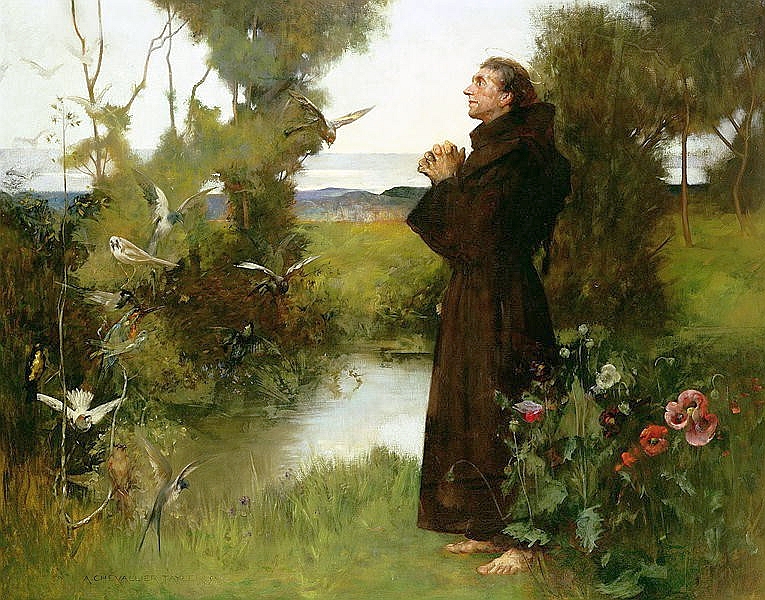 by Theresa Cavicchio
by Theresa CavicchioGetting to know Saint Francis of Assisi (1182 - 1226 A.D.) is a fascinating exercise in discovery. As his feast day comes around each year, we can gain many fresh insights that take us beyond the widespread perception of Francis as merely a lover of creation -- most notably, animals -- and patron of ecology.
Saint Francis in another light, as a broker of peace, for example, is revealed to us when we consider several incidents from his life story.
Prior to his conversion, Francesco Bernardone was a carefree youth cherishing the grand ambition of knighthood. This plan was thwarted when he was captured during a battle between Assisi and nearby Perugia. A debilitating year-long imprisonment afforded insights into the terrible consequences of war that doubtless contributed to Francis’ various efforts to negotiate peace later in life.
One such incident, related in The Little Flowers of St. Francis of Assisi, occurred after Francis’ conversion, well into his itinerant preaching ministry. The town of Gubbio was being terrorized by a wolf whose vicious assaults on both livestock and human beings rendered its citizens paralyzed with fear. The story recounts Francis’ fearlessly scolding the wolf for failing to respect God’s creatures. Francis convinced the animal to cease his merciless attacks, promising that the people would provide him with food as long as he lived. Thus peace was restored to the inhabitants of Gubbio, human and animal -- including the reformed wolf.
In 1219 A.D., Francis weathered the perilous journey to Egypt, where Christian and Muslim armies were fighting the Fifth Crusade. Ill-treated initially in enemy territory, Francis finally gained admission to the camp of Sultan Malik-al-Kamil, Muslim religious and military leader. The two maintained a remarkable atmosphere of mutual respect and interfaith dialogue, but Francis was unsuccessful, both in attaining martyrdom (his primary purpose) and in converting the Sultan. Although hostilities continued, Francis’ humility and dedication to his faith greatly impressed the Muslim leader, and Francis left his company with guaranteed safe passage.
Some years later, toward the end of Francis’ life, a contentious situation arose between the Bishop of Assisi and the town’s mayor. Since ecclesial and civil authorities typically overlapped in Europe at the time, this dispute caused troubling ramifications for the general populace.
Francis’ ability to broker peace once again was displayed in a unique way. He had recently composed his Canticle of the Creatures, or Canticle of Brother Sun, praising God for many aspects of the natural world He provided for our use and enjoyment. Upon learning of the highly strained relations between bishop and mayor, Francis altered the Canticle’s ending, adding two stanzas as follows:
All praise be yours, my Lord, through those who grant pardon for love of you; through those who endure sickness and trial. Happy those who endure in peace, by you, Most High, they will be crowned.
In seriously failing health at the time, Francis sent his friars to sing his Canticle, including these new lines, in the presence of the opposing parties in the hope that they would be reconciled. Francis would soon compose the Canticle’s final stanzas to include Sister Death, as his time on earth neared its end, but he had lived to see his hope fulfilled with the two leaders’ emotional reconciliation, and peace restored to his beloved Assisi.
Saint Francis lived eight centuries ago, but these incidents in his life can influence us in our own lives today, as we reflect upon:
~ Victims of War (military or civilian): are we able to support one of many worthwhile causes which help alleviate their suffering -- spiritual, emotional, psychological, or physical? ~ The Wolf of Gubbio: how might we reach out to assist those who suffer the ravages of hunger worldwide? ~ Francis and the Sultan: what gestures of interfaith outreach can we employ to engage others whose faith traditions are different from our own? ~ The Bishop and the Mayor: how can we foster peace in our communities, within our neighborhoods, or in our own families ?
Prayer can be the best starting point in each of these situations, perhaps by incorporating the beloved Peace Prayer of Saint Francis into our regular prayer routine.
Father Murray Bodo, OFM, describes this as “a prayer he [Francis] did not write but certainly is the way he prayed and lived and taught by example. It is a prayer that outlines everything that made Francis the peacemaker that he was and the model for peace that he is for us today” (Franciscan Spirit Blog).
Lord, make me an instrument of your peace: where there is hatred, let me sow love; where there is injury, pardon; where there is doubt, faith; where there is despair, hope; where there is darkness, light; where there is sadness, joy.
O divine Master, grant that I may not so much seek to be consoled as to console, to be understood as to understand, to be loved as to love. For it is in giving that we receive, it is in pardoning that we are pardoned, and it is in dying that we are born to eternal life. Amen.
Setting a goal to follow Saint Francis’ example by living this prayer each day is a most appropriate way to honor the little saint of Assisi, broker of peace, on his feast day and throughout the year.
© All Rights Reserved, Living His Life Abundantly®/Women of Grace® http://www.womenofgrace.com
